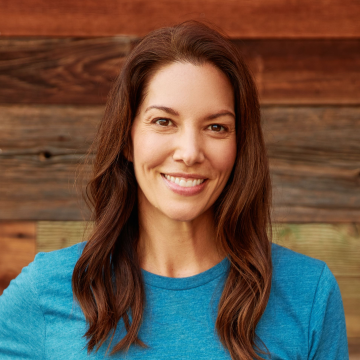What does Pam’s bum shoulder have to teach us about behavioral change and how we show up in the world?
Got something you need advice about? Ask us here: ForcesOfEqual.com/Advice/
Transcript
Pam: [00:06] You’re listening to Not Bad Advice where our goal is to offer a perspective that helps you improve one aspect of your life at a time.
[00:12] I’m Pamela Lund, and I hope that after listening you’ll think, “Hey, that’s not bad advice!”
[00:22] I’m rolling solo today without CK, because this is an advice quickie.
[00:31] So I’ve been thinking about patterns a lot lately. Specifically, movement patterns because of a chronic recurring shoulder issue that I have.
[00:46] I have a movement pattern that I’ve developed over decades, and that pattern feels right to me, but it’s not. Since it feels right, I keep doing it, but because it’s wrong, it causes pain. And even though it hurts, it’s really hard to change the pattern. I’m working to change how I move, but it feels wrong to move correctly. So I have to think every time I want to move my arm.
[01:07] Every… single… time.
[01:10] That’s a lot of work and a lot of cognitive load just to reach for a glass or adjust my ponytail. But I won’t have to do it forever; just as long as it takes to ingrain the new pattern.
[01:20] So what does my shoulder issue have to do with you? Well, the same incorrect pattern issue shows up in behaviors. And even if they don’t cause physical pain, they can cause suffering. We all have patterns like this that are unhealthy, or that prevent us from achieving our goals.
[01:40] Maybe you check your work email before going to bed, even though you know there’s a chance you’ll see something that will make you lose sleep. Maybe you eat junk food after dinner every night, even though you know it makes you feel like crap. Or maybe you emotionally shut down every time your partner brings up money, even though you know that just makes things worse.
[02:00] You can develop a pattern for anything. And over time it becomes your default behavior. Even if you know it’s not good for you or the right thing to do, you keep doing it because change is hard. And because these patterns likely helped you at some point, they feel right.
[02:17] I developed my shoulder movement pattern after an injury that made moving correctly painful, but then I never did the work to correct the new pattern. So now the new pattern I developed is what’s painful.
[02:29] When patterns of any kind start to negatively affect you, you have to question what you think is right. Because if you keep doing what feels right, without questioning, if it really is right, you’ll keep getting the same results.
[02:43] If something you’re doing, isn’t working out the way you want. It’s time to try something different. It’s That’s going to feel wrong or weird at first, and you’re going to have setbacks. But every time you see a positive outcome from your new pattern, it will get easier to repeat.
[02:59] Remember that what you’ve been doing is what got you where you are now. But if you want more, you need to develop new systems and patterns. You have the power to question and change your patterns. You have the power to change how you’re moving in the world.
[03:15] It won’t be easy. Change never is. But it’s the only way to grow.
[03:24] Your Oracle card representation of today’s message is the Fennec Fox. Fennec foxes live in the Sahara desert, and they are tiny. They only weigh two to four pounds, but they’ve adapted to have huge ears that dissipate heat, so they can withstand the high temps of the desert.
[04:10] They have many other adaptations that help them survive in intense climate, like modified kidney function to require less water and highly sensitive hearing so they can hear prey moving underground. And these adaptations allow the Fox to not only survive, but thrive. Just like the changes you can make to thrive in your environment.
[04:34] If you find yourself thinking, “Hey, that’s not bad advice” while listening today, we’d love it if you share the episode with your friends and rated it in iTunes.
[04:42] You can get in touch with us on Twitter, where I’m @Pamela_Lund and CK is @cKdisco.
[04:48] To find us on other platforms, visit ForcesOfEqual.com/Advice. There, you can also contact us if there’s something you need advice about. We’d love to hear from you.






